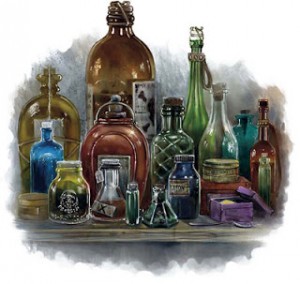On Friday we comb through our extensive archives to find an older article that we feel deserves another look. From July 2, 2013, Dungeon’s Master once again presents: 6 Tips for Making Potions Fun Again.
 Some of my fondest memories of D&D involve a situation where a character drinks an unidentified potion. The results were usually chaotic, hilarious, or both. However, as D&D changed so to did the mystery and wonder that potions can bring to the game.
Some of my fondest memories of D&D involve a situation where a character drinks an unidentified potion. The results were usually chaotic, hilarious, or both. However, as D&D changed so to did the mystery and wonder that potions can bring to the game.
In 4e D&D the system became so magic heavy that potions were of little consequence. At low levels when a potion can actually make a difference, identifying them is automatic during a short rest. I can’t remember the last time characters had a potion in their inventory that they couldn’t identify.
I’ve recently started using the D&D Next rules during public play and in my home games. It draws heavy influence from the older editions of D&D where magic was rare (much more so than it is in 4e). It’s been so long since I’ve played in games with limited magic treasure that I’ve really had to change my gaming mentality to keep things interesting. By thinking back to those fantastic campaigns I was part of in my younger years, I remember the awe and wonder in the simplest elements of the game. Everyone in the party doesn’t need a +1 sword to make their character interesting and to have fun. But when magic is introduced, it’s a big deal.
In a system with limited magic items, even consumables such as potions and scrolls are deemed valuable and important. They always have been, but when there are over 100 other magic items in a party, no one cares about a simple potion. But in a party where there are only one or two magic items, discovering a few potions in the treasure horde is a real find.